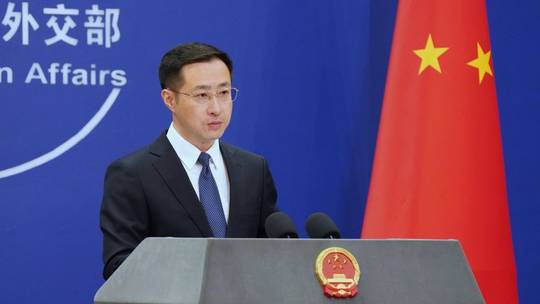China reaffirmed its commitment to deeper collaboration within the BRICS economic bloc despite the looming threat of hefty tariffs from U.S. President-elect Donald Trump. Foreign Ministry Spokesman Lin Jian emphasized on Tuesday that BRICS seeks global prosperity rather than competition with other nations, dismissing Trump’s ultimatum as counterproductive.
Trump recently warned that BRICS nations could face a 100% tariff on their goods if they proceed with plans to establish a common currency or support an alternative to the U.S. dollar. Speaking on his Truth Social platform, he demanded a guarantee from BRICS members to abstain from challenging the dominance of the dollar in global trade.
Initially comprising Brazil, Russia, India, China, and South Africa, BRICS expanded in January 2024 to include Egypt, Iran, Ethiopia, and the United Arab Emirates. An additional 30 nations have expressed interest in joining the bloc. With its focus on development and economic integration, BRICS aims to foster cooperation among emerging markets rather than promote bloc confrontation.
“China stands ready to continue working with BRICS partners to deepen practical cooperation in various fields and make more contributions to the sustained and steady growth of the world economy,” said Lin Jian during a press briefing.
Discussions about a potential BRICS currency have been ongoing but remain divisive. Russian President Vladimir Putin suggested in June 2022 that the group might create an international reserve currency, a proposal that gained momentum after Western sanctions targeted Moscow’s access to the dollar-denominated financial system.
In contrast, South African officials denied plans for a new currency as recently as this week, emphasizing the bloc’s current focus on practical financial mechanisms like increasing the use of local currencies in trade and establishing a cross-border payment system to complement the Western-dominated SWIFT network.
Brazilian President Luiz Inácio Lula da Silva has also voiced support for a BRICS trading currency, drawing parallels with the euro. However, Putin recently tempered expectations, stating that member economies need more time to develop and integrate before introducing a unified currency.
China’s support for BRICS underscores its strategic focus on strengthening ties with emerging economies, particularly as geopolitical tensions with the U.S. escalate. Lin Jian reiterated that BRICS’ mission is to promote sustainable global growth, not to disrupt the international financial order.
Trump’s tariff threats align with his broader economic strategy to reduce U.S. trade deficits, revive domestic manufacturing, and leverage economic tools for geopolitical advantage. His stance against BRICS’ financial autonomy reflects concerns about the bloc’s potential to challenge U.S. economic hegemony.
The proposed tariffs, if enacted, could significantly impact global trade, particularly for countries like China and Brazil, which rely on strong export relationships with the U.S. While Trump’s approach aims to reinforce the dollar’s dominance, it risks alienating trade partners and further fracturing international economic relations.
As BRICS nations explore ways to enhance economic independence and cooperation, the group is likely to remain cautious about overt challenges to the U.S.-led financial system. Initiatives like the cross-border payment system and local currency use reflect incremental steps towards reducing reliance on the dollar without provoking immediate backlash.
China’s resolve to support BRICS despite U.S. threats highlights its commitment to reshaping global economic governance. However, the bloc faces internal challenges in aligning its diverse member economies, which may slow progress toward more ambitious goals like a common currency.
The evolving dynamics between the U.S. and BRICS highlight a shifting global economic order. As Trump prepares to assume office, his tariff threats underscore the tensions surrounding financial autonomy and global influence. Meanwhile, China and its BRICS partners remain steadfast in their vision for economic integration and development, navigating the delicate balance between collaboration and competition on the world stage.



